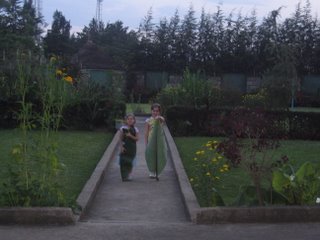

We’ve begun to settle in nicely in Addis Ababa. We live in a lovely three-bedroom house in the Old Airport section of the city, very close to the school Clara and Gwendolyne attend. The house has roundness and angles all over, with a spiral staircase in the center. Clara and we both have balconies opening from our bedrooms to the front of the house, overlooking a large terrace. The interior sports plenty of wood and marble.
Out back we have a guest house that counts a laundry room, storage room / pantry, and salon downstairs; upstairs the guest bedroom has its own bath, small storage closet, and study.
We have an enormous garden out front, so we won’t lack space to plant our vegetables once the seeds arrive. It seems that gardeners come with the houses here; ours showed up the day after our arrival. He has finished digging up one huge plot where we plan to seed our vegetables. He speaks very little English, though, so I spend lots of time looking up Amharic words in the dictionary to attempt to communicate with him.
Through a friend of a friend we also managed to hire a highly-recommended “mamita” Saturday. She’ll help us with the cooking, cleaning, shopping, and babysitting.
I’m sure our garden will do great, as we have fantastic weather here. Nearly every day we experience sunny skies until about two in the afternoon, when clouds roll in and it threatens to rain. Sometimes it does rain, but then it usually clears up by sundown.
Since we’re so close to the Equator (8 degrees North latitude), our days and nights are almost of equal length. This also implies no need for daylight savings time! Addis is in a GMT+3 time zone, while the east coast of the US is on GMT-4, seven hours behind. Once the US switches back to standard time, the east coast will be GMT-5, eight hours behind us.
The girls love their school so far, and we find the facilities and the personnel very impressive. We have access to the track, playground, and soccer pitch after hours and on weekends, a great fringe benefit.
As for the city itself, we’ve definitely arrived in the third world. Addis Ababa is a densely-populated city in the midst of a building boom that is being held back by a cement shortage. Traffic during rush hour can be very thick, and the diesel exhaust from the cars and buses can be even thicker. My work commute can take anywhere from 30 to 60 minutes, depending on traffic flow and the number of people in my shuttle.
The poverty of the country is quite evident. At some traffic lights, children or mothers with babies strapped to their backs come up to the car and ask for food or money. There always seem to be people walking or standing around on the major streets with nothing to do. Some of the streets are in well-paved and in fine shape, others are marked with potholes. In our neighborhood, there are plenty of unpaved streets marked with ruts and bumps, validating our decision to buy an SUV. The city water at our house has been out of service since we arrived, so fortunately we receive regular water deliveries into our cistern.
We are able to dial up to the Internet from home, but only for a few minutes at a time – the connection keeps dropping. Our backup power generator also comes on frequently, usually at least once a day when commercial power drops off. On Saturday we heard it come on thrice.
Ethiopians are fairly friendly, though reserved, so we’ve been made to feel welcome. Most folks seem to get by somehow with very little. In short, the country seems to be on the right path, but the infrastructure is still fairly primitive by Western standards. But we wanted to come here to experience life outside the US consumer culture.
Our air shipment beat us here, and our car has arrived in Djibouti; we’re just waiting for the bureaucratic procedures to complete so that we can receive them. Our sea shipment was supposed to arrive in Europe in the last few days; it should be flown out from there soon, so we should receive it in about two or three weeks.



